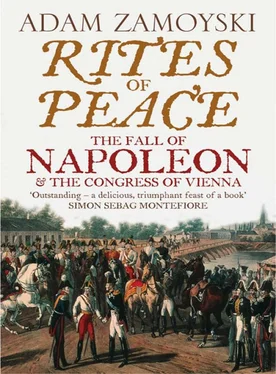The establishment of an independent Polish state would preclude Russia making any territorial gains in the west. Worse, it would probably lead to her having to give back Polish provinces she had seized in the past. Alexander could therefore only contemplate establishing a Polish kingdom within the framework of the Russian Empire, with himself as King. This would, he hoped, allay the fears of Russian opinion. But as it would also extend the frontiers of his empire far to the west, it meant that he would have to have a hand in the arrangement of Germany.
Germany had been more profoundly affected than any other part of Europe by the French Revolution and subsequent interference by Napoleon. In 1789 the German lands had belonged to the Holy Roman Empire, a bewildering patchwork of some three hundred independent sovereignties and thousands of lordships, abbeys and orders, whose forms of government ranged from absolutist monarchy, through ecclesiastical authority, to republican cities. The army of the empire was made up not only of regiments, but companies and even platoons composed of soldiers supplied by different states. The captain of a company might be commissioned by a sovereign count, the lieutenant by a free city and the second lieutenant by an abbess.
All this had been gradually swept away following French incursions into the Rhineland in 1792, and between 1801 and 1809 Napoleon thoroughly rearranged the area. His intention was to reduce and isolate Austria, to enlarge Prussia, which he hoped to keep in the French camp, and to create a number of secondary states such as Bavaria, Baden and Württemberg, whose gratified rulers would be devoted allies. By the Act of Mediatisation in 1803 he suppressed most of the sovereignties, and in 1806 he bound the remainder into the Confederation of the Rhine, the Rheinbund, of which he made himself protector. While he grouped them together in this way, his hold was based on playing them off against each other and keeping them in a state of dependence. And none of them was entirely master in his own house, as Napoleon had left a number of ‘mediatised’ counts and knights ( Standesherren ) within their realms who were subject not to them but to him.
The winners were not only the Electors of Bavaria, Württemberg and Saxony, who became Kings, or the other rulers who had seen their status raised, but also all those such as merchants liberated from archaic restrictive regulations, artisans who could throw off the shackles of the guilds, the Jews who were able to leave their ghettos, and countless others. The losers were the hundreds of dukes, princes, counts palatine, bishops, margraves, burgraves, landgraves, abbots, abbesses, grand masters and imperial knights who lost lands and prerogatives, as well as the free cities, which saw their independence abolished in the process.
The German state that had gained most was Prussia. By making common cause with France against the other German states in 1795, she had acquired valuable territories in the Rhineland, which she later exchanged for more extensive ones in central Germany. She took Hanover as the prize for supporting Napoleon against Austria in 1805. But in the following year Prussia had changed sides, and following his crushing victories over her at Jena and Auerstadt in 1806, Napoleon had considered abolishing the Prussian state altogether.
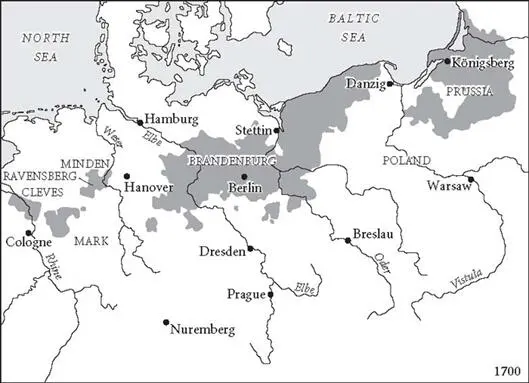
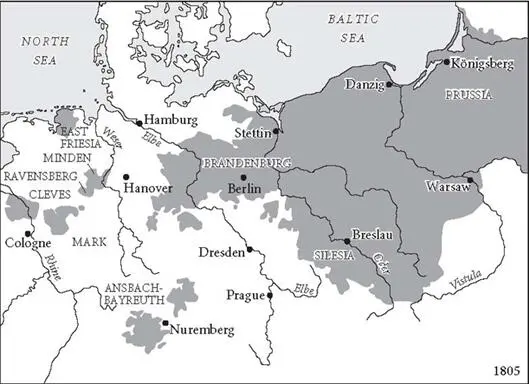
The rise and fall of Prussia, 1700–1807
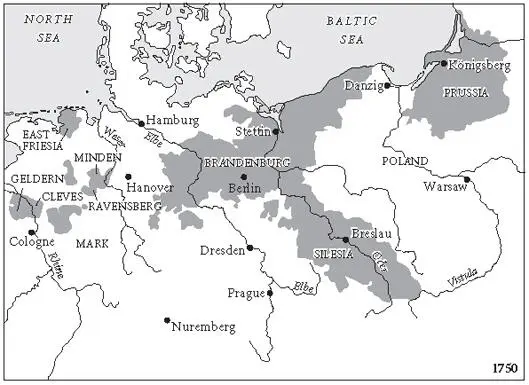
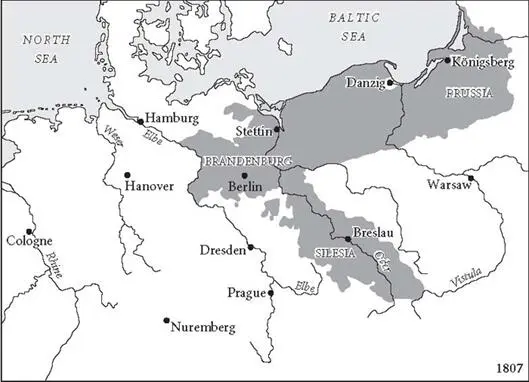
The kingdom of Prussia had only come into existence in 1701, when the Elector of Brandenburg unilaterally assumed the royal title. By 1750 it had grown territorially by over 50 per cent through the conquest of Silesia. It more than doubled in size between then and 1805, becoming a power of the first rank. But it was a curiously fragile one. Its greatest ruler, Frederick II, used to say that its arms should feature not the black eagle but rather a monkey, as all Prussia was good at was aping the great powers. It fielded six times as many soldiers relative to its population as Austria, and most of its resources were dedicated to supporting this vast army, the sole basis of its power. 7
In the event, Napoleon did not abolish Prussia; he merely stripped her of most of the Polish provinces acquired over the past decades, which he turned into a French satellite under the name of the grand duchy of Warsaw. He thereby reduced Prussia’s population from almost nine to less than five million. What remained of Prussia had to accommodate French troops, who extorted money and fodder through officials who took every opportunity to humiliate the Prussians as they spoliated their country. Given the French Emperor’s well-known contempt for the Prussians, the existence of the state remained in question. The Prussian army had been reduced to a paltry 42,000, nearly 30,000 of whom would be obliged to take part in Napoleon’s Russian campaign in 1812.
Reaction had set in as soon as the shock of the 1806 defeat had worn off. The large numbers of cashiered Prussian officers joined patriotic intellectuals to wallow in sullen resentment of all things French. Many of the officers took service in the armies of Austria or Russia, while the patriots dreamed of a national resurgence and of revenge, and took heart from the example set by the guerrilleros of Spain.
Poets such as Ernst Moritz Arndt, Heinrich von Kleist and Theodor Körner encouraged these feelings with patriotic verse and nationalist catechisms; philosophers and publicists argued about what form Germany should take in an ideal world. Young men came together in the Tugendbund , the League of Virtue, to discuss and prepare; others followed Friedrich Jahn in physical preparation for the forthcoming war through athletic exercise.
A number of senior officers devoted themselves to the cause in more practical ways. Gerhard Johann Scharnhorst, Gebhard Blücher, Leopold von Boyen and August Gneisenau worked at restructuring the army and instilling military virtues into the population as a whole. Others, such as Wilhelm von Humboldt, took a hand to the educational system, or sought to reform the state itself. Foremost among these was a civil servant by the name of Karl Heinrich vom Stein, who was, like many of the other reformers, not actually a Prussian.
Stein had been born in Nassau, a Freiherr or imperial knight of the Holy Roman Empire. There was nothing in his origins or station that destined him to become a German patriot – indeed his younger brother Ludwig became an officer in the French army. After law studies at the university of Göttingen, he took service in Prussia, originally in the Directorate of Mines, where he made a name for himself as an energetic administrator, builder of roads and digger of canals.
Stein was a man of austere morals and strict principles who disapproved of all excesses, either political as in the case of the French Revolution or moral as in the case of the sexual licence he deplored in others. But he was more elastic when it came to politics.
Though deeply shocked by the treacherous manner in which, by the Treaty of Bâle (Basel) in 1795, Prussia acquired new lands along the Rhine, he nevertheless applied himself to their incorporation into the Prussian state. Any moral qualms he might have had gave way before his overriding instinct to tidy up the messy medieval legacy and rationalise the whole of Germany into one efficient state. In common with many patriots all over Germany, he had come to the conclusion that the only way to place their country and its culture beyond the reach of interference from France or any other power was to create a unified German state strong enough to exclude outside influence and resist military aggression.
Читать дальше
